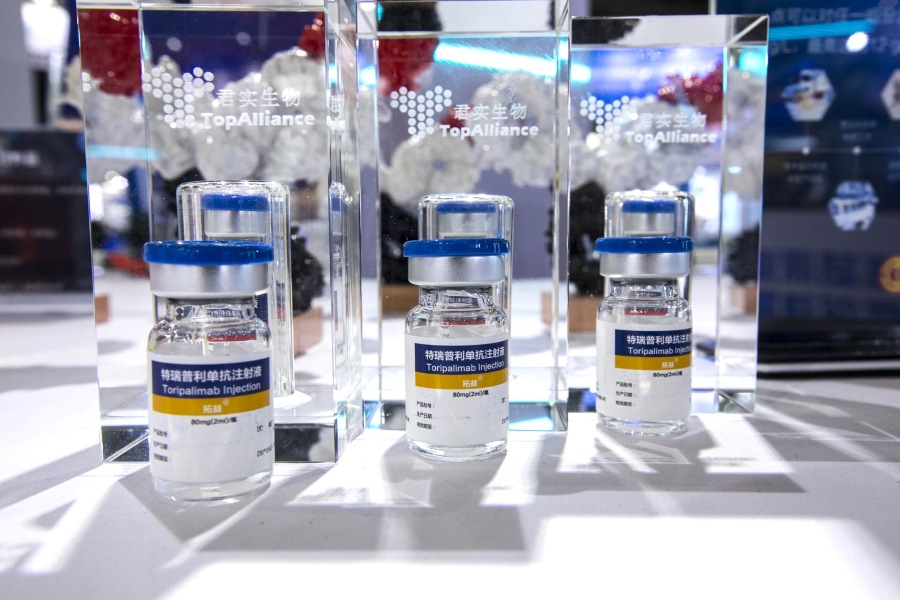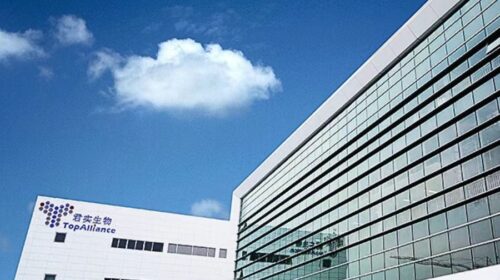Junshi Biosciences Hits Revenue Roadblock Amid Covid Drug Delay

Junshi Biosciences is facing business headwinds. Its key cancer drug has not sold as well as competing products and the company has yet to file a marketing application for its eagerly awaited Covid-19 oral drug.
Key Takeaways:
- The company logged a revenue fall of 55% in the first half of the year and posted a loss of $131 million
- Phase 3 clinical trials for its Covid-19 oral drug wrapped up in May but the company has still not yet filed an application to market the product
By Molly Wen
Shanghai Junshi Biosciences Co. Ltd. (1877.HK; 688180.SH) was tipped as an early favorite in the race for China’s innovative drugs market, but its pace has been slowed by stiff competition for cancer treatments and an uncertain launch schedule for its hotly anticipated Covid drug.
The prospects looked bright for Junshi Biosciences when it bagged the first marketing approval in China for a PD-1 cancer drug, a type of treatment that improves the body’s ability to attack tumor cells.
But despite the early advantage, the firm’s Toripalimab drug is not selling as well as similar cancer medicines. Hopes soared again when the company developed an oral drug for Covid-19, VV116, that was expected to be first in its class to hit the market. But the company has still not filed for marketing approval for the drug, which was co-developed with the Chinese Academy of Science, leaving investors disappointed.
The company released its half-year earnings last Tuesday, just one day shy of the deadline for submissions. Its revenues slumped to 946 million yuan in the first half, a drop of just over 55% from the year-earlier period, when earnings had been lifted by a one-off gain. This time, the earnings lacked a booster to match the handsome licensing and franchising income earned last year from a collaboration with Eli Lilly (LLY.US) in developing the Covid-19 neutralizing antibody Etesevimab.
As a result, the company swung from a profit of 10.53 million yuan ($1.5 million) in the first half of last year to a 910 million yuan ($131 million) loss in the same period this year.
When the company’s shares listed on Shanghai’s Nasdaq-style STAR Market in July 2020, the price soared by a stunning 172% on the debut day. But it has been downhill from there. Weighed down by a lackluster business performance, the company’s Hong Kong share price has fallen by more than two thirds from a high of HK$97 last February to just around HK$27 recently. Investors are left wondering about the chances of a comeback for the formerly hot stock.
Still waiting for Covid drug go-head
Hopes for the Covid-19 oral drug VV116, regarded as a potential game-changer for the company’s performance, have elevated the stock price in the past. Last December, investors cheered when the drug was approved for emergency use in Uzbekistan. And in May, the company revealed that the drug had completed its Phase 3 clinical trial for early-stage treatment of Covid-19 patients with mild or moderate symptoms, with Pfizer’s (PFE.US) oral drug Paxlovid as the reference.
The drug met the primary and secondary efficacy endpoints envisioned in the trial plan. And the company is currently discussing with regulators about filing for marketing approval.
But three months have passed. The company has not submitted any application, nor has it disclosed any progress on that front. In its financial statement, Junshi Biosciences said it had carried out an international multi-center Phase 3 clinical trial with collaborators targeting severe Covid-19 cases and another one targeting mild and moderate cases.
By contrast, Genuine Biotech secured approval for its oral antiviral Azvudine 10 days after Phase 3 trial results were published. The drug became the first homegrown small-molecule Covid-19 oral medication marketed in China. But not all drugs that complete three phases of clinical trials will be approved. For example, Fosun Pharma (2196.HK; 600196.SH) partnered with German pharmaceutical company BioNTech to bring the mRNA Covid-19 vaccine Comirnaty to China in 2020. Billions of doses of the vaccine have been administered around the world and both its efficacy and safety have been proven in many studies. But the drug has still not won approval from Chinese medicine regulators.
Confidence in the outlook for Junshi Biosciences has been shaken. In June, the international investment bank Macquarie Group gave the company an “underperform” rating for the first time. Although optimistic that the VV116 Covid drug will gain approval for emergency use in the third quarter, Macquarie said the company’s commercial prospects are still cloudy due to competition from other oral drugs, unclear demand and pricing factors.
The report also mentioned the company’s key product, the cancer drug Toripalimab, noting that sales last year were lower than for rival drugs in the same category, highlighting an uncertain outlook for Junshi Biosciences products and putting a question mark over the company’s commercialization capability.
According to the company’s latest financials, Toripalimab’s sales in the first half of this year were around 298 million yuan, 195% higher than in the latter half of 2021. PD-1 drugs, which target proteins that regulate the immune response to cancer cells, are generally considered to be a wide-spectrum category of cancer drugs.
Toripalimab was initially approved for four relatively low-profile conditions. But in May the approved use of the drug, in combination with chemotherapy, was expanded to include a form of cancer in the esophagus, increasing the number of potential patients who could receive the treatment.
Hoping for a finance injection
In addition, an application is under review to have the drug approved for the treatment of a common type of cancer that develops in lung tissue. The company is also conducting clinical trials to prove the drug’s potency in treating higher incidence cancers of the liver, breast and lung. It is likely to secure approvals for multiple uses this year or next.
The company has more than 50 candidate drugs in its pipelines, with around 20 of them in clinical trials. Junshi Biosciences spent a total of 1.06 billion yuan on R&D in the first half of the year, a year-on-year increase of just over 12%. The company invested more in R&D than the amount it earned in the period, spending a sum equivalent to around 112% of revenue.
With multiple pipelines to be supported and bumps on the commercialization road, the company is facing financial stress despite its cash pile of 3.4 billion yuan, which has fallen around 20% from the same period a year earlier. Last Friday, the company released a draft of an application for targeted financing. It plans to issue no more than 70 million A-shares and raise up to 3.97 billion yuan mainly for innovative drug development.
The company has been rather reticent in the capital market for quite some time. Its valuation in the Hong Kong market is just around 5.9 billion yuan. With a price-to-sales (P/S) ratio of 5.4 times, compared with the 15.4 times of BeiGene (BGNE.US; 6160.HK; 668235.SH) and nine times of Innovent Biologics (1801.HK), Junshi Biosciences is relatively undervalued in the industry.
The key to the company’s future performance lies in whether it can grab more market share for its PD-1 cancer drug and whether it can win approval for its Covid-19 oral drug. Investors may have to wait more patiently for positive news.
To subscribe to Bamboo Works free weekly newsletter, click here





